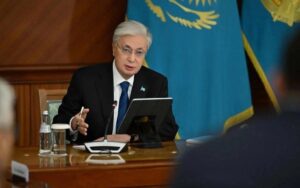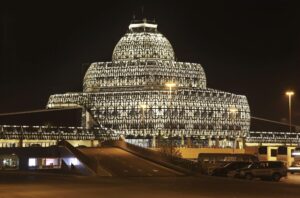BBC Arabic Radio goes off air after 85 years

London, The Gulf Observer: “Tears in my eyes as I listen to the last broadcast by BBC Arabic Radio, closing down after 85 years. It meant so much to so many people here over the decades,” tweeted British journalist Jim Muir, Middle East correspondent for the BBC News, “Now the airwaves are dead. End of an era.”
BBC’s Arabic radio service officially ended its decades-long broadcast on Friday, leaving behind a legacy that many believe to be everlasting.
The station launched in early 1938 as the BBC Empire Service’s first foreign language radio broadcast.
Many journalists and public figures took to Twitter to express grief and share fond memories of BBC’s Arabic radio station. Some believed the event marked a decline in the United Kingdom’s soft power while others recalled their days at the studios.
“It’s far beyond sad and painful to see BBC Arabic radio shutting down today,” wrote Egypt-based BBC Arabic correspondent Sally Nabil on Twitter.
“It’s incredibly difficult to describe how we feel!” She added.
Amal Mudallali, former permanent representative of Lebanon to the UN, said: “As someone who worked for the BBC Arabic, I do not understand the decision.
“It is the only thing people know and remember about Britania, as we call it, in the region for generations.”
The final words and signature statement of BBC Arabic radio presenter Mahmoud Almossallami, “Huna London” (This is London), seems to have brought tears to many eyes.
Almousallami’s daughter, Osha, wrote: “I grew up listening to my dad presenting on BBC Arabic, and now here he is, presenting the final hour of BBC Arabic before it’s closed and taken off the air.
“It really is the end of an era.”
The head of David Nott Foundation, Elly Nott, wrote: “Huna London no more,” hailing BBC Arabic radio for helping her to learn its language.
BBC News Lead Technical Operator Jack Mooney shared a footage showing the last moments as the Arabic news network went off the air, while sound producer Tome Roles wrote: “I’ll always treasure the magic of sitting in a tiny studio at 3 am in London, picturing the sun rising thousands of miles away, and wondering about the lives of those tuning in.”
“It’s a painful moment,” wrote photographer Ali Al-Baroodi.
“BBC Arabic was one of few windows to the world in the time of the economic blockade (in the) 1990s (and) ISIS occupation,” he added, “Iraq was under (a) huge blackout. My father used to stock batteries for his radio in prep for the tough times.”
BBC correspondent Emir Nader shared the last two minutes of the Arabic radio’s final broadcast and wrote: “Today is a tragic day for Arab media… One of many huge losses following cuts in BBC World Service’s budget.” – Courtesy: BBC


